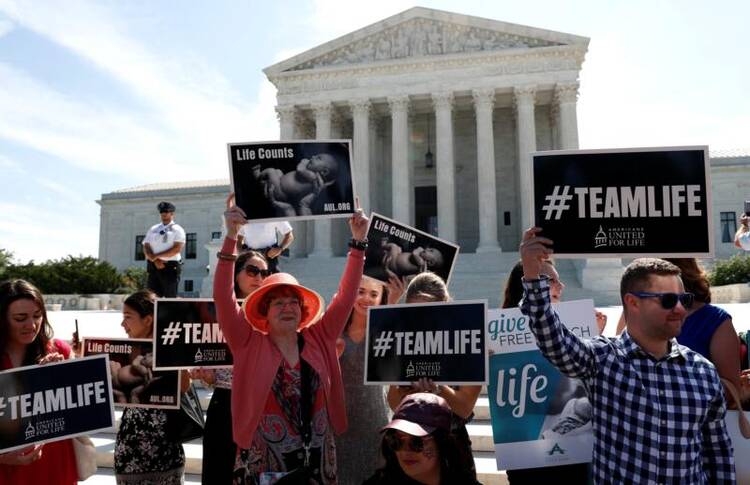WASHINGTON (CNS) -- The president of the U.S. Conference of Catholic Bishops urged U.S. senators on July 6 not to support using the Roe v. Wade decision legalizing abortion as a litmus test for confirming judicial nominees.
Cardinal Daniel N. DiNardo of Galveston-Houston wrote to members of the Senate, which will soon begin deliberations on President Donald Trump's nominee to fill the vacancy being left on the Supreme Court by the retirement of Justice Anthony Kennedy.
Trump said he will announce his choice for the court July 9.
The cardinal's letter emphasizes that the USCCB "does not support or oppose confirmation of particular presidential nominees."
But he said he has "grave concerns about the confirmation process ... being grossly distorted by efforts to subject judicial nominees to a litmus test in support of Roe, as though nominees who oppose the purposeful taking of innocent human life are somehow unfit for judicial office in the United States."
"By any measure," Cardinal DiNardo said, "support for Roe is an impoverished standard for assessing judicial ability. For forty-five years, Roe has sparked more informed criticism and public resistance than any other court decision of the late 20th century."
He pointed to polls taken over the past few decades that show that most Americans oppose Roe's provision for unlimited abortion. The cardinal also called attention to a growing number of state legislatures that have passed pro-life laws.
In addition, he said, "mainstream medicine rejects abortion, with the vast majority of physicians and hospitals -- religious and secular -- refusing to participate in abortions."
"Even legal scholars who support abortion have criticized Roe for not being grounded in the U.S. Constitution," he said.
"If a Supreme Court ruling was wrongly decided, is widely rejected as morally flawed and socially harmful, and is seen even by many supporters as having little basis in the Constitution, these are very good reasons not to use it as a litmus test for future judges," Cardinal DiNardo wrote. "Further, a nominees' faith should not be used as a proxy for their views on Roe," he added. "Any religious test for public office is both unjust and unconstitutional."
The Catholic Church stands out for "its commitment to the right to life from conception until natural death," he said. "This ethic has profound consequences not only for abortion," he said, but for all life issues, including the death penalty, scientific research and access to health care and for "the role of the state in promoting the common good."
Civil society "will be all the poorer" if the Senate rejects well-qualified judicial nominees "whose consciences have been formed in this ethic," Cardinal DiNardo said.











Again Bishops, not that facts or evidence in the real world are anything you care about, at least based on your history of continuous refusal to pay any attention to such things as evidence and facts but all existing evidence seems to prove with fair confidence that all countries which restrict abortion accrue them in number, along with greater numbers of maternal deaths. This seems especially true, if those countries don't supply free and easy access to the best artificial contraception methods - like the U.S (or not for long), or give free or easily affordable government funded day care for all citizens - like the U.S. does not do, or offer free and unlimited health care to mothers and children - like we in the U.S. do not do (anymore), or demand their countries companies give long-term paid maternity and paternity leaves - like the U.S. does not do.
Roe v. Wade should be a litmus test because the majority of Americans have stated they do not want it overturned in its present state - period. Again - that is just another fact.
Also, when supporting a present law be overturned for new law, knowing the far most likely result of the new law will be the opposite result it is designed to obtain, and that the result of the new law will likely end up with possibly far more deaths of both the born and unborn in our country, those are pretty good reason to use it as a litmus test for any judge. Intentionally uninformed jurists should not be supported for our highest court or any court in our land. Such people should not be supported as Bishops either but we don't get a vote on that one. Ignorance of the truth or facts only ends up with grave injustice and injury.